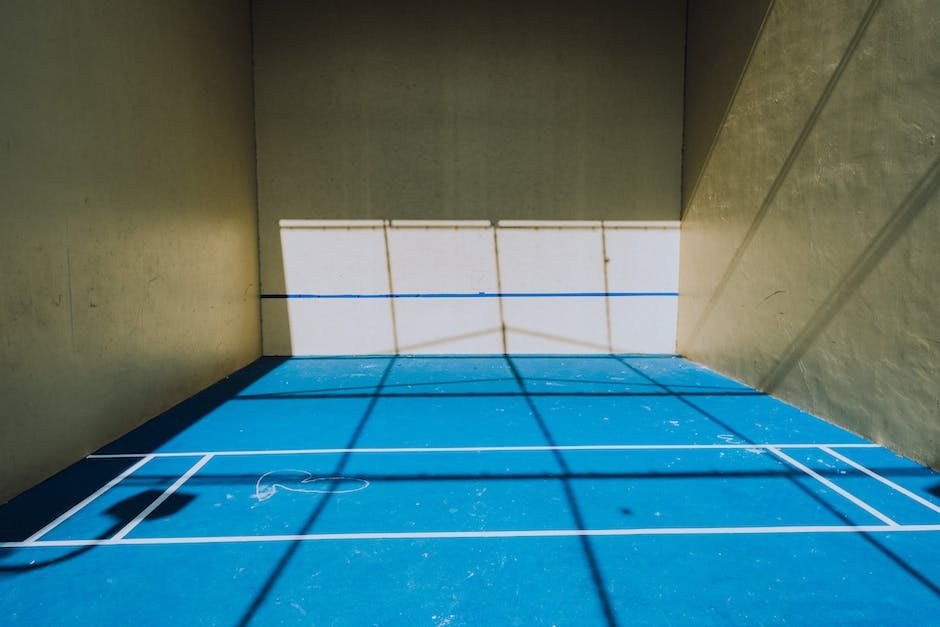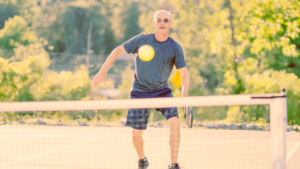Imagine a sunny afternoon, where laughter fills the air and smiles brighten the faces of both young and old. A game is being played that transcends generations, bridging the gap between grandparents and grandchildren. Here, on the pickleball court, families come together to bond over a passion that is truly for all ages. Pickleball, a sport that originated in the backyards of Washington state, has quickly garnered a devoted following around the world. Combining elements of tennis, badminton, and table tennis, this unique game has become a favorite pastime for families seeking a fun and interactive way to spend time together. So, grab your paddles, step onto the court, and discover the joy of family bonding through the exhilarating world of pickleball.
Table of Contents
- Family Fun: How Pickleball Brings Generations Together
- Health and Fitness Benefits of Pickleball for the Whole Family
- Pickleball: A Beginner’s Guide to Get Your Family Started
- Creating Lasting Memories: How Pickleball Strengthens Family Bonds
- Tips for Organizing a Family Pickleball Tournament
- Q&A
- In Summary

Family Fun: How Pickleball Brings Generations Together
Pickleball, the trendy racquet sport that combines elements of tennis, badminton, and ping pong, has become a popular choice for family entertainment. With its simple rules and accessible equipment, pickleball provides a unique opportunity for different generations to come together and enjoy a fun-filled activity.
One of the remarkable aspects of pickleball is its ability to engage players of all ages and skill levels. Whether grandpa is a seasoned athlete or little Timmy is discovering his love for sports, pickleball offers a level playing field where everyone can participate and have a blast. The court size is smaller, the net is lower, and the equipment is lighter, making it easier for elderly family members or young kids to get involved.
Playing pickleball as a family can create lasting memories and foster stronger bonds between different generations. It provides an opportunity for grandparents to share their wisdom and experience with the younger ones, while the kids infuse the game with their boundless energy and enthusiasm. Together, they can strategize, cheer each other on, and celebrate both victories and defeats.
- Benefits of Family Pickleball:
- Encourages physical activity
- Strengthens family relationships
- Promotes teamwork and communication
- Boosts hand-eye coordination
- Creates a sense of camaraderie and belonging
So, gather your family members, grab some paddles, and head to the nearest pickleball court. Whether you’re laughing, bonding, or engaging in friendly competition, you’ll find that pickleball truly brings generations together and makes for a memorable shared experience.

Health and Fitness Benefits of Pickleball for the Whole Family
Pickleball, the exciting and fast-paced paddle sport, offers numerous health and fitness benefits for the entire family. It’s a fantastic way to bond, stay active, and improve your overall well-being. Here are some of the incredible health benefits that pickleball can bring into your lives:
– Cardiovascular Health: Pickleball gets your heart pumping and blood flowing, making it an excellent aerobic exercise. The constant movement and quick bursts of energy during a match help improve cardiovascular endurance, reducing the risk of heart disease and strengthening your cardiovascular system.
– Improved Balance and Coordination: This dynamic sport requires swift movements, quick reflexes, and hand-eye coordination. Regular pickleball sessions can tremendously enhance balance and coordination for players of all ages, aiding in the prevention of falls and injuries.
– Physical Agility and Flexibility: Playing pickleball involves constant footwork, pivoting, and reaching for shots. This enhances agility, speed, and flexibility. As you engage in this fun sport, you’ll notice increased joint mobility, better muscle flexibility, and overall better physical performance.
– Strength Building: Pickleball is an excellent way to strengthen muscles and increase overall body strength. The sport engages various muscle groups, including those in the arms, legs, core, and shoulders. The repetitive nature of swinging the paddle and moving around the court helps build muscle endurance and tone your body.
– Mental Well-being: In addition to physical benefits, pickleball offers mental health advantages too. It promotes active social interaction, relaxation, and stress reduction, improving mental well-being and boosting psychological resilience for the whole family.
Discover the joy of pickleball and reap the incredible health and fitness benefits it offers. Gather your loved ones, head to the court, and embark on a thrilling journey to a healthier and happier lifestyle!
Pickleball: A Beginner’s Guide to Get Your Family Started
Welcome to the world of Pickleball, a fun and exciting sport that can be enjoyed by the whole family! If you’re new to the game or looking to introduce your loved ones to this popular sport, this beginner’s guide is the ideal resource to get you started on your pickleball journey.
Pickleball is a racket sport that combines elements of tennis, badminton, and ping pong. It can be played both indoors and outdoors on a court divided by a net. The game is played with paddles and a plastic ball with holes, similar to a wiffle ball, which makes it easier to control and slows the game down, making it perfect for beginners.
To help you dive into the world of pickleball, here are some key tips and guidelines:
- Choose the right equipment: To get started, you’ll need pickleball paddles, balls, and a net. Look for paddles that suit your needs, and don’t forget to grab some pickleballs specifically designed for this sport. You can find affordable starter sets that include all the necessary equipment.
- Master the basic rules: Pickleball has a straightforward set of rules that are easy to grasp. The game is played in singles or doubles, and the objective is to hit the ball over the net and into the opponent’s court without letting it bounce twice. The serving team must serve the ball diagonally, and points are scored when the opposing team fails to return the ball correctly.
- Take some lessons: It’s always beneficial to receive guidance from an experienced player or take lessons from a qualified instructor. Pickleball clinics or classes can provide you with the techniques, strategies, and rules essential for improving your game. Plus, learning as a family enhances the fun and promotes healthy competition!
With this beginner’s guide, you’re well on your way to enjoying the thrill of pickleball with your family. It’s a fantastic sport that combines exercise, coordination, and friendly competition. So, grab your paddles, head to the nearest pickleball court, and let the fun begin!
Creating Lasting Memories: How Pickleball Strengthens Family Bonds
Pickleball is more than just a sport; it is a powerful tool that can strengthen family bonds and create lasting memories. Whether you are a seasoned player or a beginner, the game of pickleball can bring families together in a unique and exciting way.
One of the key aspects of pickleball that strengthens family bonds is its accessibility to players of all ages and skill levels. From grandparents to grandchildren, everyone can participate and have fun on the court. This inclusivity fosters a sense of togetherness and teamwork, as family members cheer each other on and work together towards a common goal.
Another way pickleball strengthens family bonds is through the opportunity for friendly competition. Tournaments and friendly matches provide a platform for family members to challenge each other and push their boundaries. This healthy competition not only improves individual skills but also encourages communication, support, and respect among family members.
Playing pickleball as a family also creates countless opportunities for shared experiences and memories. Whether it’s laughing at a funny shot, celebrating a well-played game, or bonding over post-game snacks, pickleball offers moments that will be cherished for years to come. These shared experiences create a strong foundation of memories and help to build a closer relationship among family members.
In conclusion, pickleball is not just a game; it is a powerful vehicle for creating lasting memories and strengthening family bonds. Through its accessibility, friendly competition, and shared experiences, pickleball brings families together in a unique and enjoyable way. So grab your paddles, hit the court, and let the bonding begin!
Tips for Organizing a Family Pickleball Tournament
Are you considering organizing a thrilling pickleball tournament for your family? Look no further! We have compiled a list of tips to help you plan a memorable and enjoyable event for everyone involved.
- Set a Date: Choose a date that works best for all family members to maximize participation. Consider weekends or holidays when the majority of the family will be available.
- Choose a Venue: Find a suitable location with enough pickleball courts for the tournament. Ensure the venue is easily accessible and has amenities like restrooms, seating, and parking.
- Create Teams: Divide family members into teams based on skill levels, ensuring a fair balance of expertise and experience. This encourages healthy competition and enhances the tournament’s excitement.
- Establish Tournament Rules: Clearly communicate the rules to all participants beforehand. Include guidelines for scoring, game duration, and any specific regulations required for fair play.
- Provide Equipment: Make sure to have an ample supply of pickleball paddles, balls, and nets available for the tournament. Encourage participants to bring their own as well.
- Arrange Refreshments: Organize a refreshment station where players and spectators can rejuvenate during breaks. Offer snacks, drinks, and water to keep everyone hydrated and energized.
- Create a Schedule: Develop a detailed schedule outlining the sequence of matches, breaks, and any additional activities. This helps maintain a smooth flow throughout the tournament.
- Promote Team Spirit: Encourage participants and spectators to show support by wearing matching team colors or creating team flags and banners. This fosters a sense of unity and sportsmanship.
- Recognize Achievements: Award winners and participants with certificates, trophies, or small tokens of appreciation. Recognizing achievements adds an extra element of excitement and motivation.
With these tips in mind, your family pickleball tournament is sure to be a grand success! So gather your loved ones and prepare for an action-packed day of fun and friendly competition.
Q&A
What is pickleball and how is it played?
Pickleball is a paddle sport that combines elements of tennis, badminton, and ping pong. It is played on a smaller court with a paddle and a plastic ball. Players serve the ball underhand and aim to hit it over the net without it being returned.
Is pickleball suitable for all ages?
Absolutely! Pickleball is a game for all ages, from young children to seniors. It is easy to learn the basics and can be played at various skill levels, allowing anyone to participate and enjoy the game.
How can pickleball strengthen family bonds?
Pickleball provides families with a fun and active way to spend time together. By playing as a team or against each other, family members can strengthen their relationships, create lasting memories, and enjoy some healthy competition in a friendly environment.
Does pickleball offer any health benefits?
Yes, pickleball offers several health benefits. It improves cardiovascular fitness, enhances agility and balance, and helps with coordination. Playing pickleball regularly can also contribute to maintaining a healthy weight and reducing stress levels.
Where can families play pickleball?
Pickleball courts can be found in various recreational centers, community parks, and sports clubs. Many places now offer pickleball as part of their facilities, making it easier for families to find a court near them and enjoy the game together.
What equipment is needed to play pickleball?
To play pickleball, you will need a pickleball paddle and pickleball balls, both of which are easily available at sports stores or online. Comfortable athletic shoes are also recommended to ensure safety and support during gameplay.
Can pickleball be played indoors or only outdoors?
Pickleball can be played both indoors and outdoors. While outdoor play offers the advantage of fresh air and nature, indoor courts provide shelter from bad weather conditions, allowing families to enjoy pickleball year-round.
Is there a pickleball community or league for families to join?
Yes, there are many pickleball communities and leagues that families can join. These provide opportunities for regular play, skill development, and even tournaments. It’s a great way to connect with other pickleball enthusiasts and expand the family’s social circle.
Is pickleball a safe game for children and older adults?
Pickleball is generally considered a safe game for children and older adults. The slower pace of the game compared to sports like tennis reduces the risk of injuries. However, it’s always important to play with caution, follow safety guidelines, and consult a doctor if you have any concerns.
In Summary
As the sun begins to set on the vibrant pickleball court, a sense of fulfillment and togetherness lingers in the air. Laughter and cheers still echo, slowly fading into the warm summer breeze, but the echoes of family bonding are etched in our hearts forever.
No other game has the remarkable ability to bring together individuals of all ages quite like pickleball. It is as if the court itself acts as a magical portal, transcending time and generation gaps, creating a space where unity and shared experiences emerge effortlessly.
From the youngest member of the family, their small frame furiously chasing the neon-colored ball, to the matriarch and patriarch, their faces glowing with a timeless joy, pickleball bridges the divide like no other activity. It surpasses barriers of age, physicality, and skill level, nurturing the bonds that hold families together.
The rhythmic symphony of paddle meets ball weaves an intricate tapestry of shared memories. With every lob, every slam, and every gentle dink, connections are made, deepening the unbreakable ties. It is in these spirited exchanges where life lessons are learned and stories, both old and new, are shared.
Caught up in the excitement, the role of teacher and student becomes delightfully blurred. In this democratic sport, age is just a number, and everyone has something to learn from one another. The elders pass on their wisdom, their wealth of experience, while the young ones inspire with their unyielding resilience and infectious spirit.
Like a secret language spoken among family members, pickleball possesses its own unique set of rules, traditions, and inside jokes. It is within these seemingly small details that the true essence of family bonding lies, fostering a sense of belonging that extends far beyond the boundaries of the court.
As the final rounds draw to a close, a serene calm envelops the court. The laughter subsides, only to be replaced by heartfelt smiles and knowing glances. Pickleball, once just a game, has become the vessel through which unforgettable memories were forged, forever etched into the family’s collective narrative.
In the end, it is the shared experiences, the moments of triumph and defeat, the unbridled joy, and the enduring love that truly make pickleball a game for all ages. So, let us embrace the spirit of unity, grab our paddles, and step onto the court to etch our own family adventure, pickleball style. For when we play together, we are not simply playing a game – we are creating lifelong memories, intertwining our hearts, and proving that bonds formed through love and laughter are truly unbreakable.
As an affiliate, my content may feature links to products I personally use and recommend. By taking action, like subscribing or making a purchase, you’ll be supporting my work and fueling my taco cravings at the same time. Win-win, right?
Want to read more? Check out our Affiliate Disclosure page.




